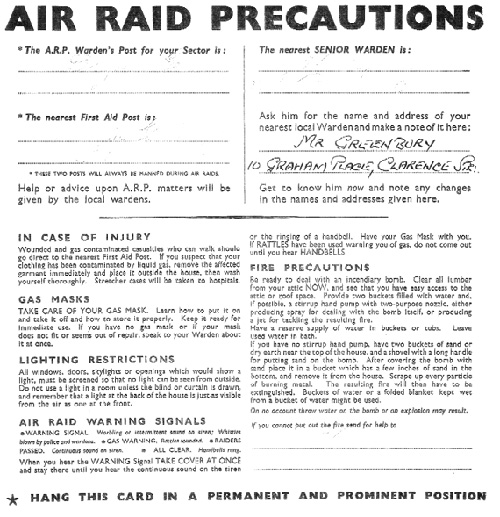
Air Raid Precautions Card (HO 186/2247)
Transcript
AIR RAID PRECAUTIONS *
The A.R.P. Warden’s Post for your Sector is: ____________________________________
*The nearest First Aid Post is : ____________________________________
*These two posts will always be manned during air raids Help or advice upon A.R.P. matters will be given by the local wardens.
The nearest SENIOR WARDEN is: _____________________________________
Ask him for the name and address of your nearest local Warden and make a note of it here: Mr Greenbury 10 Granham Place, Clarence Street Get to know him now and note any changes in the names and addresses given here.
_____________________________________________________
IN CASE OF INJURY
Wounded and gas contaminated casualties who can walk should go direct to the nearest First Aid Post. If you suspect that your clothing has been contaminated by liquid gas, remove the affected garment immediately and place it outside the house, then wash yourself thoroughly. Stretcher cases will be taken to hospitals
GAS MASKS
TAKE CARE OF YOUR GAS MASK. Learn how to put it on and take it off and how to store it properly. Keep it ready for immediate use. If you have no gas mask, or if your mask does not fit or seems out of repair, speak to your Warden about it at once.
LIGHTING RESTRICTIONS
All windows, doors, skylights or openings which would show a light must be screened so that no light can be seen from outside. Do not use a light in a room unless the blind or curtain is drawn and remember that a light at the back of the house is just as visible from the air as one at the front.
AIR RAID WARNING SIGNALS
*WARNING SIGNAL Warbling or intermitent sound on siren. Whistles blown by police and wardens. GAS WARNING Rattles sounded. *RAIDERS PASSED Continuous sound on siren. *ALL CLEAR Handbells ring. When you hear the WARNING Signal TAKE COVER AT ONCE and stay there until you hear the continuous sound on the siren or the ringing of a handbell. Have your Gas Mask with you. If RATTLES have been used warning you of gas, do not come out until you hear HANDBELLS.
FIRE PRECAUTIONS
Be ready to deal with an incendiary bomb. Clear all lumber from your attic NOW, and see tha tyou have easy access to the attic or roof space. Provide two buckets filled with water and, if possible, a stirrup pump with two-purpose nozzle, either producing a spray for dealing with the bomb itself, or producing a jet for tackling the resulting fire. Have a reserve supply of water in buckets or tubs. Leave used water in bath.
If you have no stirrup hand pump, have two buckets of sand or dry earth near the top of the house, and a shovel with a long handle for putting sand on the bomb. After covering the bomb with sand place it in a bucket which has a few inches of sand in the bottom and remove it from the house. Scrape up every particle of burning metal. The resulting fire will have to be extinguished. Buckets of water or a folded blanket kept wet from a bucket of water might be used.
On no account throw water on the bomb or an explosion may result. If you cannot put out the fire send for help to
________________________________________
* HANG THIS CARD IN A PERMANENT AND PROMINENT POSITION
5. Look at Sources 5 a and b. These are wartime warning posters.
- What dangers do these sources warn the public about?
- Who was the local air raid warden for Drypool Green?
- What was the air raid signal for ‘all clear’?
- In the months leading up to September 1939 many towns practised their air raid signals and taking shelter. Why do you think this was necessary?
- Read the section in Source 5a called ‘Fire Precautions’. Which parts are the public
- likely to follow?
- likely to ignore?
- Look at Source 5b. Read all the labels. How would each precaution help save lives if there was an air raid?
